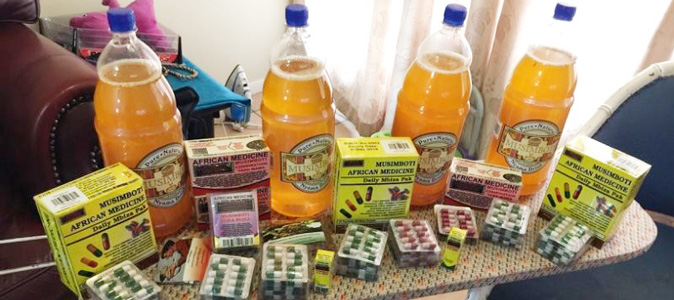
When Musimboti nyama herbal drink took Zimbabwe by storm just after the turn of the millennium, it caused quite a stir and proponents of traditional alternative therapy went into an overdrive.
By Phyllis Mbanje
They claimed that the “miracle” drug could cure cancer, HIV and Aids and a host of other chronic ailments.
There was a frenzied rush for the drink which could be accessed from leading supermarkets.
The ailing and those who just wanted to prop up their immune system gouged themselves on the golden coloured concoction.
However, regulatory body Medicines Control Authority of Zimbabwe (MCAZ) banned the drink and ordered that it be withdrawn from the shelves.
For the next 14 years there was a protracted battle between the MCAZ and Musimboti makers.
The dispute later dragged in the Traditional Medical Practitioners Council (TMPC) which registered Musimboti.
- Chamisa under fire over US$120K donation
- Mavhunga puts DeMbare into Chibuku quarterfinals
- Pension funds bet on Cabora Bassa oilfields
- Councils defy govt fire tender directive
Keep Reading
The TMPC argued that MCAZ had no mandate to regulate traditional medicine.
Manufacturers of Musimboti, (which means essential), said the drink was not a medicine but a herbal immune booster.
But the regulatory body insisted that medicines or complementary medicines that were manufactured on a commercial scale for sale to the public must meet the standards of manufacture of any other medicine.
An old promotional material for Musimboti, herbal products read: “Try our Musimboti sweet drink for the whole family and start seeing the benefits and also go ahead and get our different products for ladies and men from skin conditions, to sexual health, to literally barrenness and all other issues we face health-wise. Try Musimboti today.” Early this year the Musimboti brand reappeared once again.
Musimboti Traditional Science Institute operations manager Newton Mudzingwa could not be drawn to comment on whether the hatchet with MCAZ had been buried and chose instead to promote his products.
He said traditional knowledge was amassed and passed from generation to another and prior to tablets and injections, there were no diseases such as high blood pressure and diabetes.
Musimboti Traditional Science Institute, a member of the Aids Services Institute headquartered in Kamfinsa, Greendale, sells products like immune boosters and modulators.
“We treat all infections affecting the general body using detoxification or cleansers. Most important, we also manage and treat all types of cancers,” Mudzingwa said.
The institute also claims to treat women’s diseases, paying attention to period pains, irregular bleeding, infertility and fibroids.
For men, it claims to tackle erectile dysfunction, low libido and prostate cancer without an operation.
Mudzingwa said while treatment of cancer was very expensive in hospitals, he could do the same for $500 only, depending on the stage.
“We treat cancer which is traditionally known as nhuta or gomarara or invukuzane in Ndebele.
Mudzingwa said cancer is curable based on the behaviour of the mole [nhuta].
The way the mole behaves inside the soil is similar to how it behaves in the human body.
“Many people do not believe in their traditional medicines, they prefer to use the western types of medicine and approaches which include chemotherapy, radiotherapy and surgical procedures which make the cancer very much aggressive and it spreads faster after the procedures,” he explained.
The herbalist said society had to change its attitude towards traditional medicines and approaches to treatment. “The medical side needs to move with time and give patients the opportunity to choose the type of care they want,” said Mudzingwa.
A MCAZ spokesperson said Musimboti’s case was yet to be considered and that following the gazetting of the complementary medicines, all sticky issues would be resolved.
“Previously there was no legislation that was specific to address such matters but now we do,” he said.










